Victoria 3 will let you conquer the world from the negotiating table
Paradox's Victorian society sim is back.
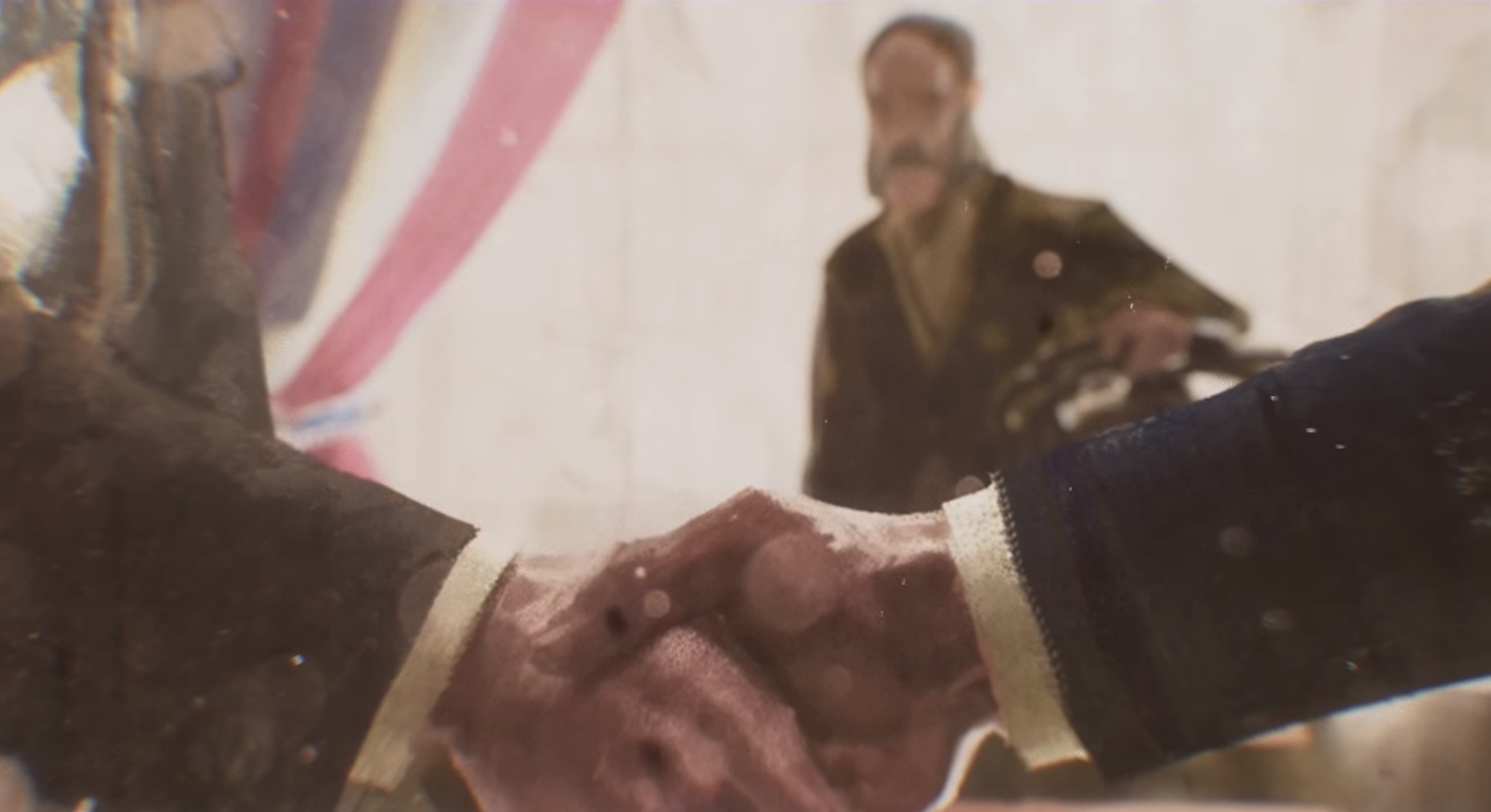
Victoria 3 is a longstanding meme among Paradox fans. Victoria 2 was one of the last games to launch before the arrival of Crusader Kings 2, which marked the start of a new era for the studio. That was followed up by Europa Universalis 4, then Hearts of Iron 4, but as the years went by there was no mention of another sequel for its deeply political grand strategy series. "Victoria 3 when?" players would ask, but the response was only ever a wry grin or a look of exhaustion. Under every tweet from Paradox, every hint about a new game, you'd find people asking about Vicky 3. And now it can stop, because it is indeed coming.
For the uninitiated, Victoria takes Paradox's love of maps, menus and sometimes Byzantine systems and applies them to the 19th and early 20th centuries. Just as Crusader Kings is all about dynasties and Hearts of Iron is all about war, Victoria is focused on politics and demographics, using them both to reflect the upheaval of the tumultuous era.
If you've dabbled in Crusader Kings and Europa Universalis, Victoria 3 won't be too alien. Like EU, you control a nation and all the broad complications that come with that, but like CK there's a big emphasis put on people. Instead of trying to appeal to and appease individuals, however, you need to handle pops, big blocks of people with shared interests, jobs and cultures. And you'll need their support to push through the changes required to make your country of choice a powerhouse.
"The pops are the atoms of this simulation," says lead designer Mikael Andersson. "Everything that you do has an impact on the pops, causes the pops to change, and in return the pops reflect that back on the country."
Getting the backing of these folks is easier said than done, of course, but you've got a lot of tools to do it. Tech, economic policies, political ideologies, diplomacy, conquest—there are plenty of ways to interact with the world and get both people and other nations on your side, or the other one. But people are a complicated bunch, with all sorts of perspectives. And there are loads of them—if not quite as many as there are in 2021—all simulated, to a degree.
"We actually have the entire world's population of 1836, around a billion people, as close as we can get it—it's of course not 100% accurate—simulated in this manner," says game director Martin Anward, "resulting in thousands and thousands of different pops all across the world."
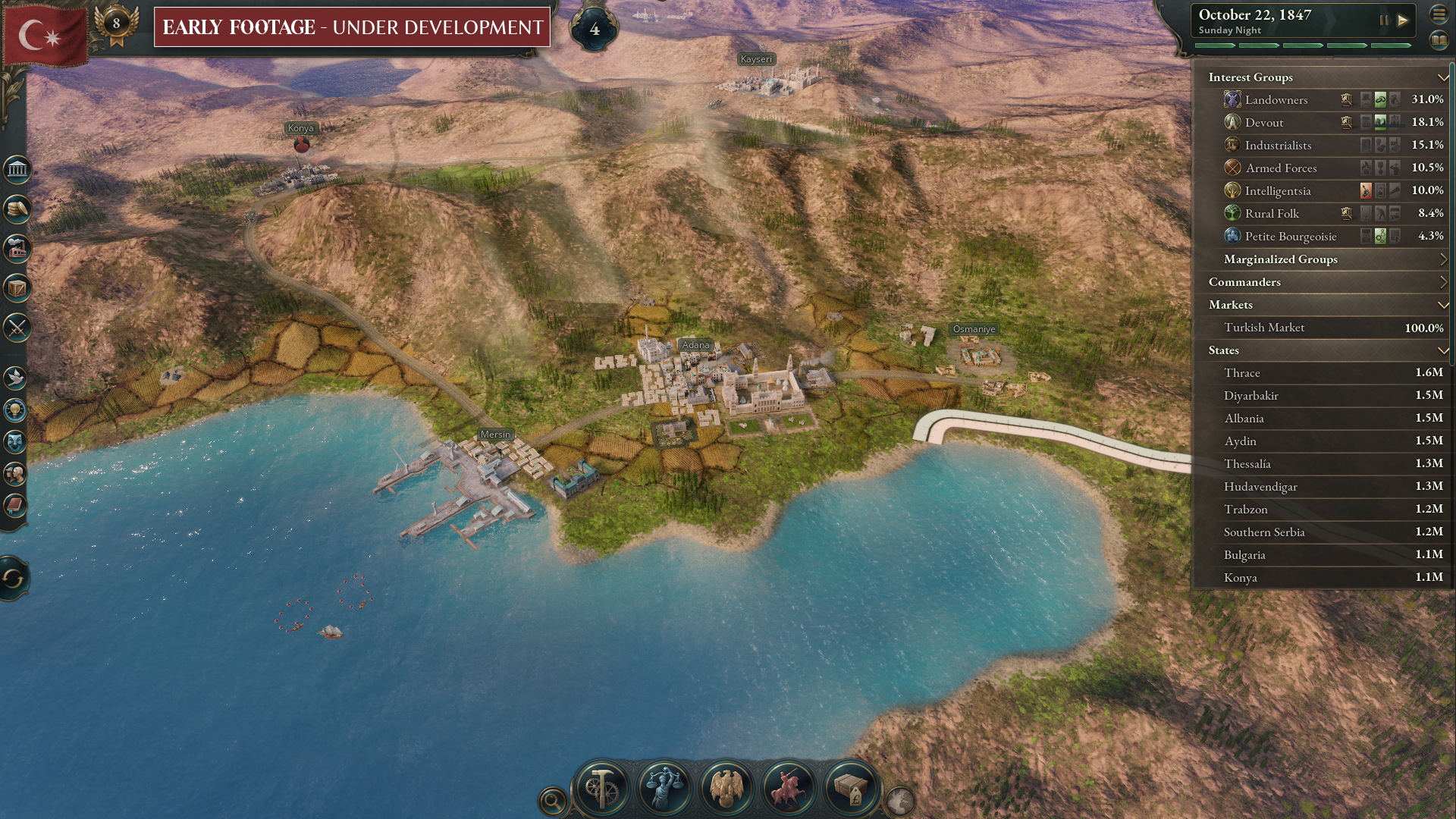
Maybe you've ruined the economy, and now you need to make the angry capitalists happy again. Just looking at their page reveals information about their literacy, how radical they are and how loyal they are, giving you an overview of how they're getting on. But capitalists are not a homogenous group. There are also a variety of interest groups with different ideologies that people can belong to, beyond their pop designation. A lot of capitalists are industrialists, naturally, who generally like low wages and screwing over pensioners, but others might be devoutly religious or staunch monarchists as well.
The biggest gaming news, reviews and hardware deals
Keep up to date with the most important stories and the best deals, as picked by the PC Gamer team.
In the hands-off demo we're watching Prussia, where the head of the capitalists is very much pro-royal, and these leaders exert a great deal of influence over their block. In this case, then, making changes that pleases monarchists will also create more support amongst the capitalists. As ever, clicking on one thing takes you down the rabbit hole, making you dig deeper and deeper to find a solution to your problem, and at the same time revealing just how interconnected everything is.
These interest groups can be immensely powerful, especially when they're in government. Even when they're not the top dog, though, you'll still need to pay them heed and try to keep them happy—an ultimately Sisyphean task thanks to the fact that pretty much every choice you make will piss off somebody. Such is the curse of politics. The groups are only as influential as they are popular, however. "The interest groups gain their power from the pops, so without pop support the interest groups have no purpose at all really," says Andersson. So in a conservative agrarian society, you probably won't have to worry about industrialists or trade unionists as much as you might in a more liberal nation.
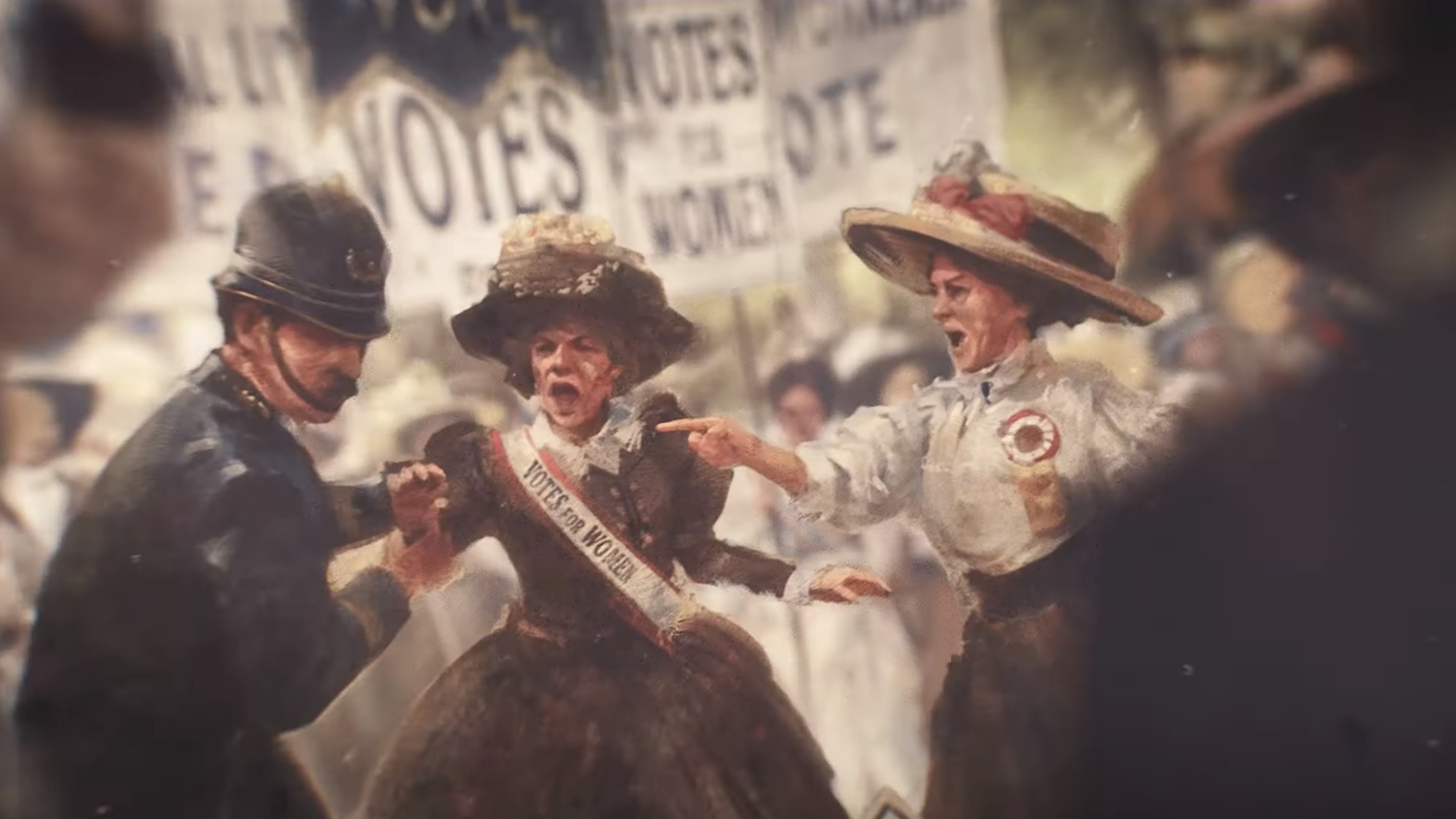
Paradox describes Victoria 3 as a management game, and like a lot of management games you can expect to be up to your neck in buildings, which will in turn affect your economy, your capacity for trade and a whole host of other things. Your government and policies will also have a big impact on these buildings, too. If you're in a liberal democracy, you'll see a lot of privately owned businesses that will be managed by their owners. Communist countries, meanwhile, aren't that into private property, so the businesses will be state owned, giving you more direct control. Your economic system, naturally, opens and closes a lot of doors when it comes to earning you dosh.
"The pops are the atoms of this simulation."
Mikael Andersson, lead designer
Businesses will be crucial to an industrialised economy, but you won't be making cold, hard cash from them most of the time. Instead, you'll be relying on various taxes, depending on your economic system. It still means you want to make sure they're all ticking along nicely, of course, because effective businesses can, in theory, pay higher wages, which you can then get a piece of downstream. "So you're not, as a country, making money directly," says Andersson. "You are providing job opportunities for your population and taxing the economy to get your income."
Like pops, businesses are grouped together. So instead of looking at every individual tooling workshop, you get an overview of the lot of them. In Prussia, the tooling workshops are run by German protestant capitalists, 600 of them, who also have 1,400 dependents—all of whom can be affected by your tweaking. Here you can also see the economic disparity that exists in a capitalist society. The 2,000 capitalists connected to the tooling workshops have an average annual wage of £21, but they also employ machinists, who only earn a quarter of that, and labourers, who earn even less. Despite the prosperity of the capitalists, those lower down the ladder are "impoverished" and "struggling", respectively.
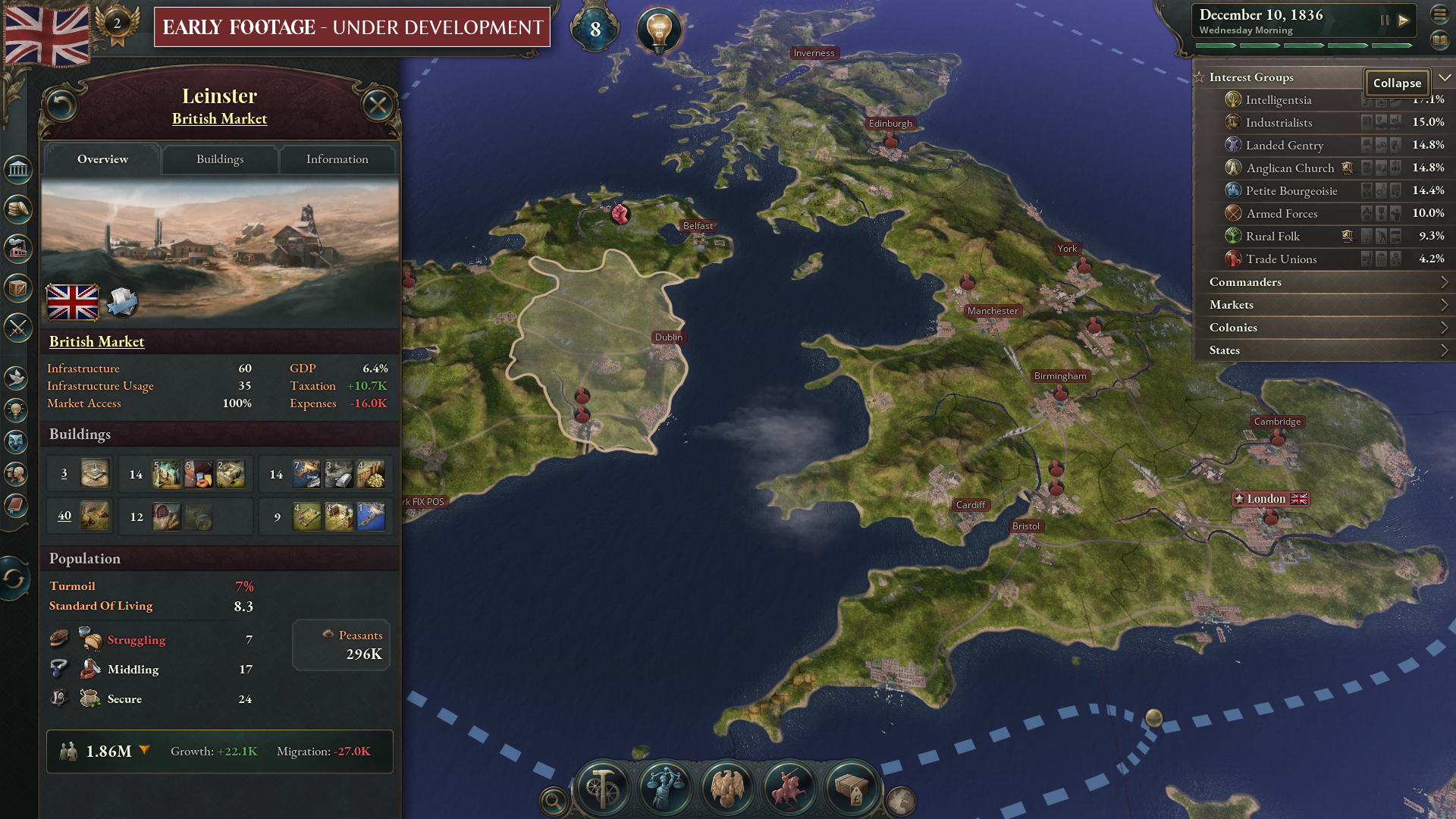
Thankfully, you can make their lot in life a little better. You might want to pass some new laws—split into power structure, the economy and human rights—to ensure that workers are paid a decent wage and there's a strong support structure to help lift them up, but just like the miserable real world, making change is not a simple matter of enacting a bunch of nice new laws. If the government and most prominent interest groups have a problem with it, you're going to struggle to improve things. But those are things you can fiddle with, conveniently.
Since interest groups rely on pop support, you might want to consider influencing your people to erode their base. "There are a lot of things that factor into which interest groups and ideologies pops will support," says Anward. "Pops that are more educated will be more politically active, so if your poor people are less educated, the trade unions and socialists will find themselves with less poor workers willing to support them because the people that are their natural base are ignoring politics." If you fancy stoking the fires of a socialist revolution, then, you should provide more education to the working class. Revolutions are rarely peaceful, but if it comes to conflict, Victoria 3 will let you switch sides, playing the revolutionaries instead.
While Paradox isn't ready to show off warfare, military conflict plays a smaller role in Victoria 3. You should still expect some fighting, but diplomacy is a much more important battlefield.
"We want to really emphasise the role of diplomacy and the ability to get things with diplomacy without necessarily escalating into armed conflict," says Anward. You can still be a belligerent arse, you can still change your nation's borders, but you can do it all without dedicating the next few hours to a gargantuan war. If you play your cards right, anyway.
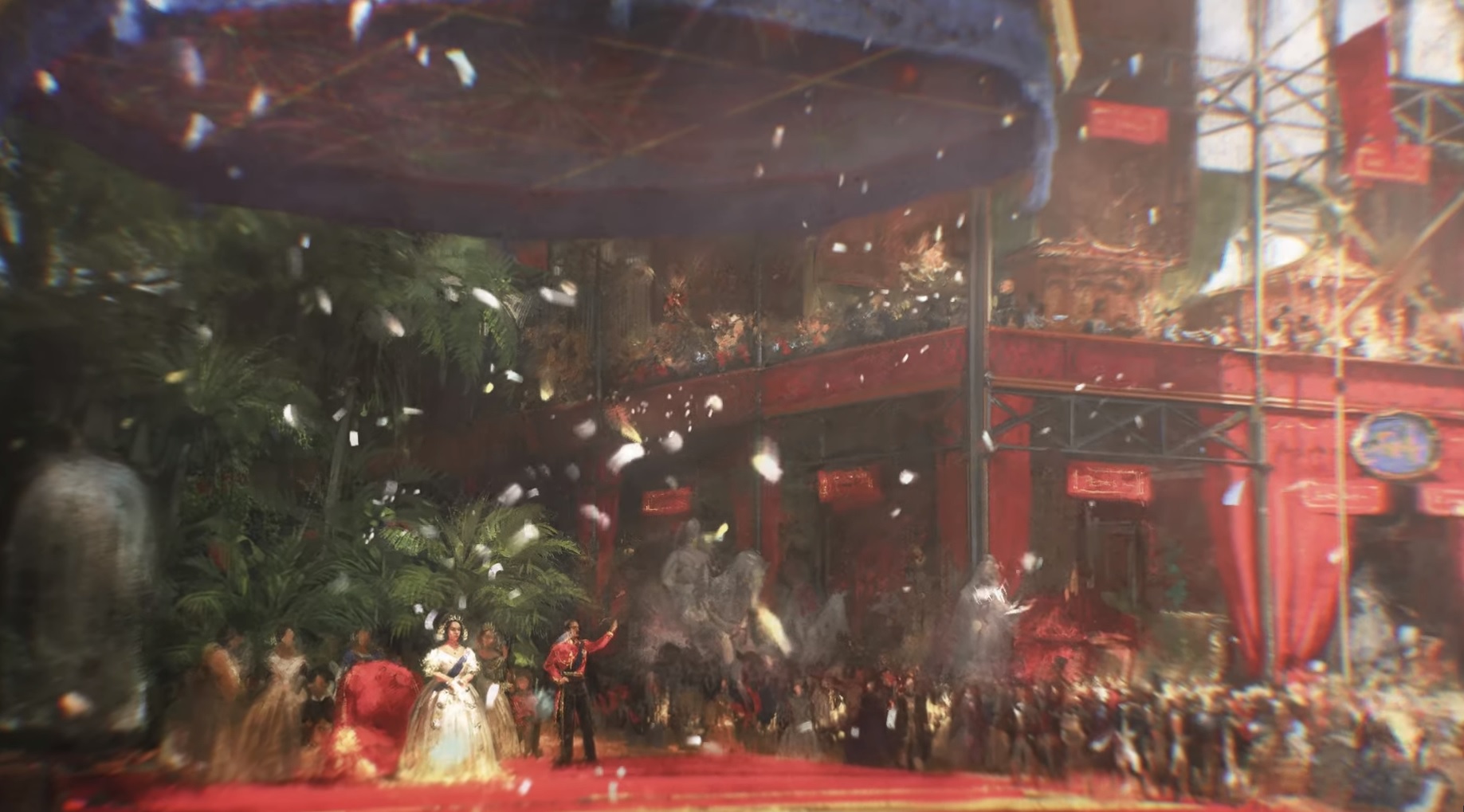
As usual, you'll have your basic diplomatic actions, letting you improve or ruin your relationship with other nations, forge alliances and make other agreements, but a more interesting system comes in the form of diplomatic plays, an expansion on the crises introduced in Victoria 2: Heart of Darkness.
Diplomatic plays are essentially "diplomatic bullying", according to Anward. If you want a slice of land, to make a nation a puppet or some other big move, you'll have to go to the negotiating table. In the demo, Prussia wants control of Holstein, which is under the control of Denmark. The Danes, as you might expect, are less enthusiastic about this. Their goal in the negotiation is to get Prussia to pay reparations for the diplomatic incident and give up Pomerania. At this stage, Prussia has the upper hand thanks to its much larger army—the threat of war is a big motivator. But both sides can sway other nations to their cause, perhaps with the promise of territory should it come to war. This allows weaker nations to still make some significant moves, as long as they've got bigger nations watching their back.
While it might seem obvious to just make a whole bunch of promises you have no intention of keeping—since you're trying to avoid a war—your international pals aren't stupid. They might really want what you're offering, but they'll weigh that up against how greedy you're being and their relationships with all the other nations involved. It's not as simple as just throwing potential gifts at people.
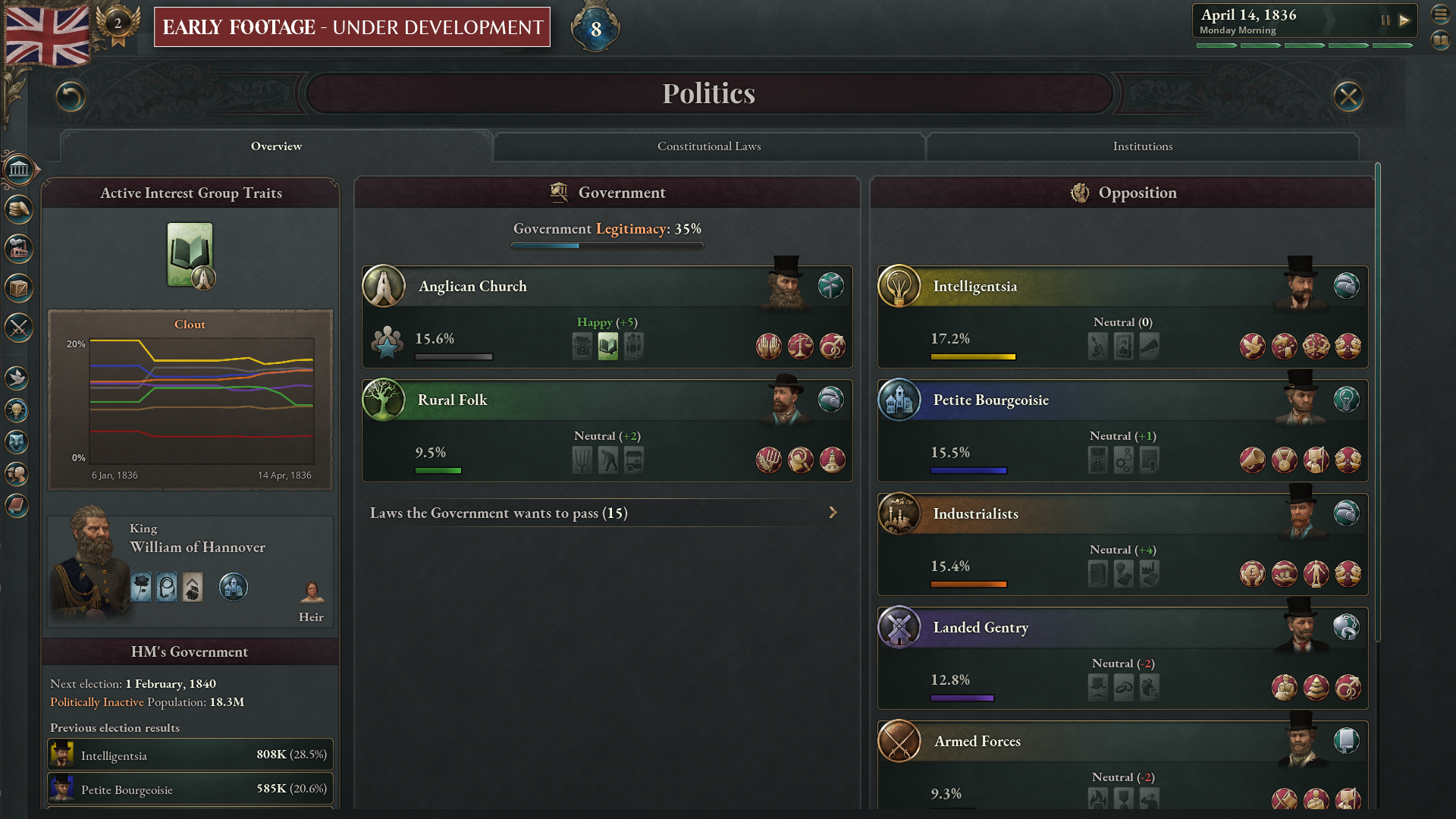
Britain comes to the side of Prussia, but Prussia's main rival Austria also gets involved, adding new war goals and making the gambit a much bigger risk. Andersson also notes that Britain is not the most reliable pal, whereas Austria is definitely out for blood. "This isn't looking particularly great for me," he laments. And then he backs down. "The only thing I will lose is Pomerania," he adds. If he went to war, he might have lost a lot more. I have a feeling some diplomats will be in trouble, but it's great to see these big changes being enacted at the negotiating table without any armies getting involved.
"We want to really emphasise the role of diplomacy and the ability to get things with diplomacy without necessarily escalating into armed conflict."
Martin Anward, game director
Despite only taking place over 100 years, each day has multiple ticks, so you can expect games to last as long as your CK3 or EU4 playthroughs. It's such a busy era, full of revolutions, that the world will change a lot more over that small period. This is especially notable in the tech tree, which is focused more on big, transformative discoveries, running the gamut from big guns to big ideas like egalitarianism. As we've seen in other PDS games, research isn't entirely direct. You can pick things to focus on, but since your nation doesn't exist in a vacuum, you'll also see all of these things spread from other places. Usually that would be a good thing, but not in Victoria 3. If you're an autocratic nation with a tightly controlled populace, for instance, you probably don't want your people learning all about free speech and human rights.
"Which can actually be a reason to want to limit it," says Anward. "Even though it will give you more technology and in some ways more power, if some technologies are just too dangerous for your country—it can be advantageous to use more censorship and have more of a buffer against ideas spreading rapidly into your country."
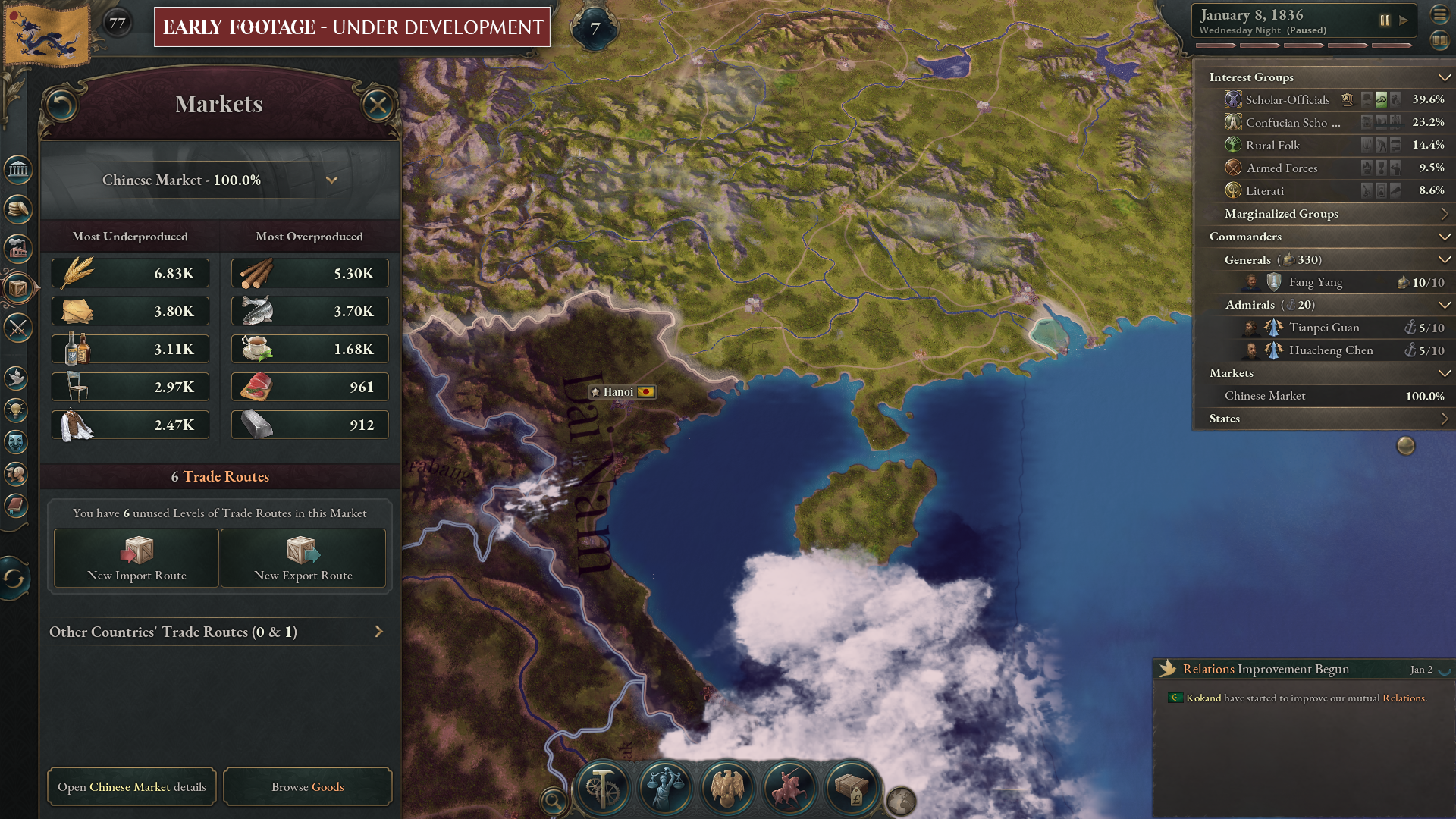
You'll be able to play one of a hundred nations, and given that plenty of people like to play their Paradox games by picking the most unassuming nation and trying to dominate the world, Victoria 3 will have more of a distinction between them, making playing a minor nation a different experience, at least until you beef up.
"What we've been trying to do with the power ranking system is to—not in a very hard or defined way, but more as an emergent gameplay thing—get the player to engage in different kinds of gameplay," says Andersson. Picking a minor power, you'll be more focused on growing your economy, and while you might be influential locally, you won't be a big player on your continent or globally. Major powers are a bit more spread out, maybe with some colonies, and that gives them more influence that translates to more fiddling around with the political and diplomatic systems. The great powers are big picture nations and get tools to reflect that, like the ability to make sweeping changes like upgrading all your industries at once. They're also more international, ultimately trying to bend the world to their will.
Even amid Paradox's complex grand strategy games, Victoria is dense. There's a level of inaccessibility that you sort of expect from these games, but there have been some big leaps in recent years, most notably in the tooltip-heavy CK3. Paradox is still considering how it makes Victoria 3 more digestible, and one of the possibilities is tweaking how the easy mode works.
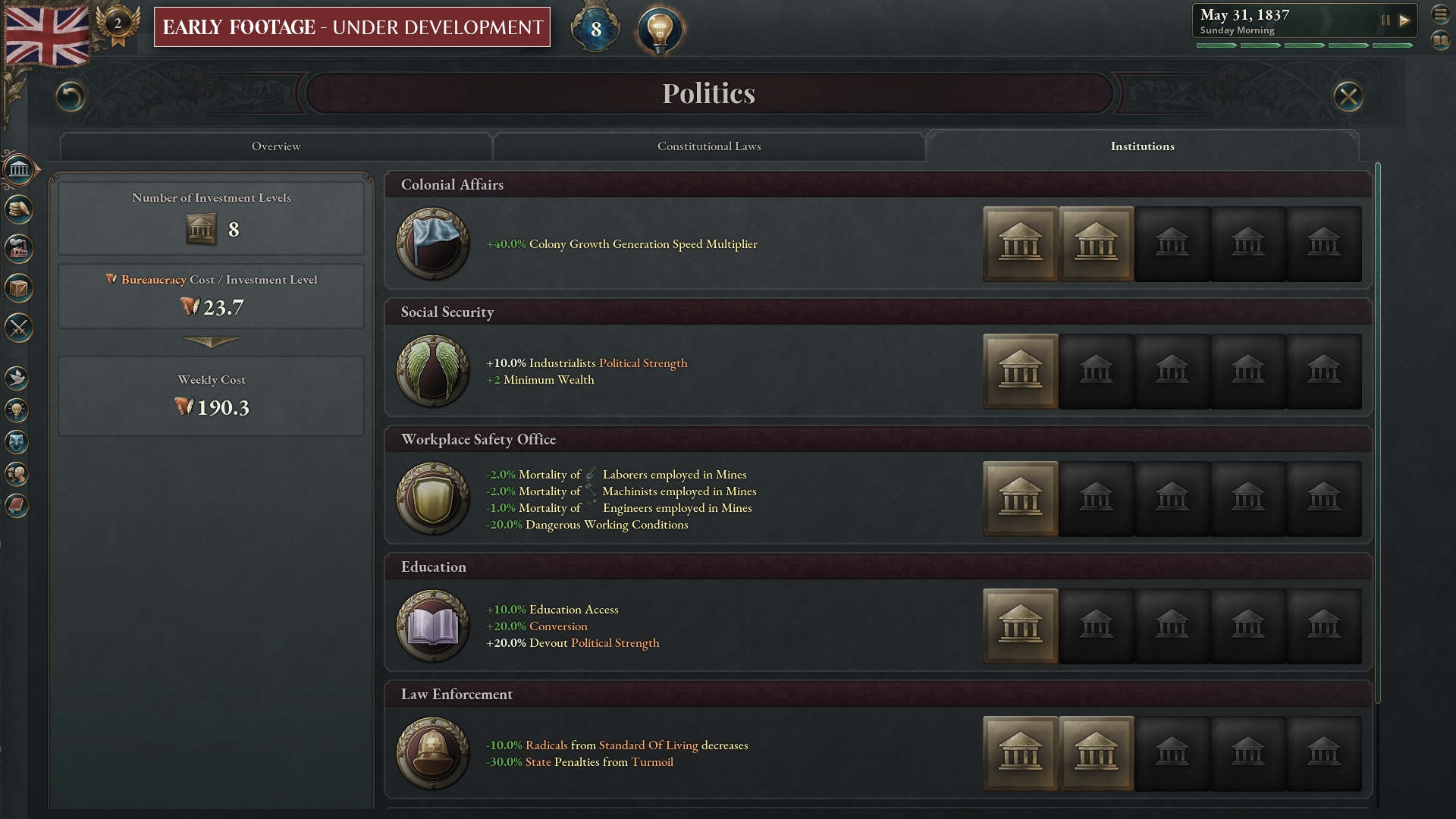
"One thing we're looking into and want to explore more is having the easy mode being more focused so you can do more of the running your own country without worrying that a great power's going to come and take all your toys away," says Anward, "rather than making it about you getting a bunch of boosts to your economy."
Anward's worried those boosts would make people too reliant on them, making it difficult for them to play without them. It's all still up in the air at the moment, though, but he emphasises that there will be a mode and tools that will make it easier to learn the game. "We don't just want this to be a game for the hardcore Victoria audience," he says. "We want to bring in new people who would be interested in this kind of society simulation, might be interested in management games, and we want the Victoria franchise to of course grow." You don't need to get into the nitty gritty, either. Andersson adds that there are enough macro-level tools that you can guide your nation and see the world react to your actions without necessarily optimising your nation and becoming one with all the systems and stats.
While the announcement that it's coming should satiate some fans, the question of when it's going to arrive is yet to be answered. After all the delays and the eventual shelving of Bloodlines 2, Paradox probably won't be discussing a date until it's set in stone. Back to waiting, then.

Fraser is the UK online editor and has actually met The Internet in person. With over a decade of experience, he's been around the block a few times, serving as a freelancer, news editor and prolific reviewer. Strategy games have been a 30-year-long obsession, from tiny RTSs to sprawling political sims, and he never turns down the chance to rave about Total War or Crusader Kings. He's also been known to set up shop in the latest MMO and likes to wind down with an endlessly deep, systemic RPG. These days, when he's not editing, he can usually be found writing features that are 1,000 words too long or talking about his dog.

